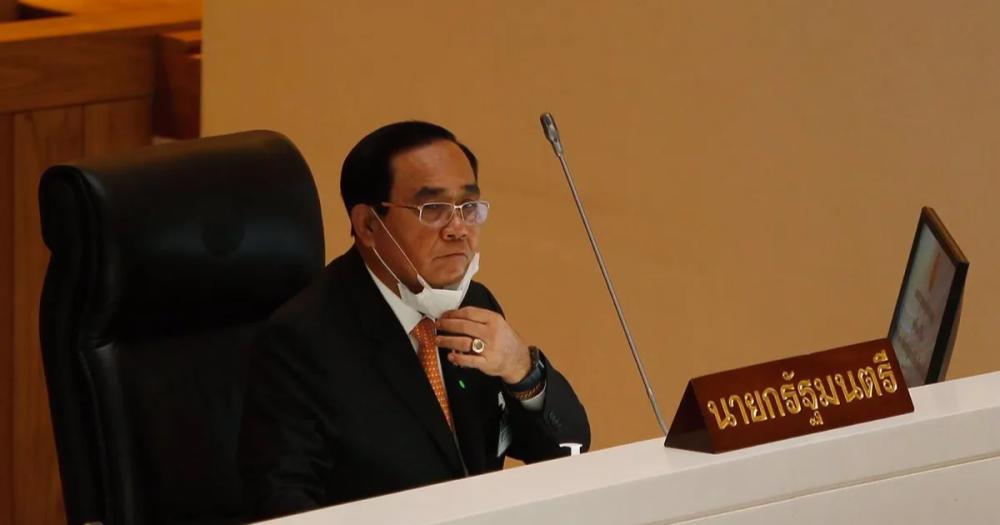Follow us on Telegram for the latest updates: https://t.me/mothershipsg
Thailand's king Maha Vajiralongkorn has approved the dissolution of the country's parliament, paving the way for a general election to be held in May, Bloomberg reported.
The order to dissolve parliament was published in the Royal Gazette on Monday (Mar. 20), three days after Prime Minister Prayuth Chan-Ocha submitted a decree to disband the House of Representatives for royal endorsement.
The law stipulates that the next election must be held within 60 days of the dissolution of parliament. The Election Commission must also confirm the date of the next election within five days, although it has previously decided May 7 to be the polling day.
Why the dissolution is important
Through the dissolution, members of the parliament will have more time to switch parties. This gives Prayuth more time time to recruit members to run for his new party, which listed him as the only candidate for the country's prime minister post.
If parliament had completed its term and ended as scheduled on Thursday (Mar. 23), candidates will have to be a member of a party for at least 90 days before the election. The duration is shortened to 30 days in the case of dissolution, Nikkei Asia reported.
Speaking to Bloomberg, Yuttaporn Issarachai, a political scientist at Sukhothai Thammathirat Open University described the election as a "battle of ideology that will determine whether Thailand will stay on the side of conservatism or sway more to the liberal side”.
At the same time, Issarachai acknowledged the prominent presence of the military in Thailand's politics, and that military reform was unlikely to happen.
Uncertain election for Prayuth
The stakes are high for Prayuth who wants to prolong his eight-year term as head of the government.
The former Chief of Royal Thai Army became the prime minister in 2014 after a coup, but his military government has steadily lost support from the Thai population since then.
Prayuth would need to rebuild confidence among the populace should he wish to extend his grip on power.
This election would also include first-time voters who were likely witnesses and participants in the unprecedented 2020 protest, where many young Thais demanded a new constitution and a reduction in the power of the monarchy.
This group makes up five per cent of eligible voters.
Furthermore, with the continuous scrutiny over Prayuth's reign, the military-supported Palang Pracharath Party — which many believed to have been established to back Prayuth — has decided to pick another prime minister candidate.
Prayuth was forced to form a new political party in a bid to retain his position, Bloomberg reported.
He also faced strong opposition from the Pheu Thai party which seeks to end a decade of military rule. The party is represented by Paetongtarn Shinawatra, daughter of former prime minister Thaksin Shinawatra who was overthrown in a coup in 2006. Over the last two decades, Thaksin-affiliated parties have won the most seats in every Thai election.
A poll conducted last December found that the Pheu Thai party received 49.75 per cent support among 2,000 people surveyed.
Winning election might come down to party's ability to canvass
But voting for a political party might pose a challenge as there are essentially no ideological differences across the political parties, said Khemthong Tonsakulrungruang, a political analyst from Chulalongkorn University, at the ISEAS – Yusof Ishak Institute Regional Outlook Forum on Jan. 10.
Winning the election would likely come down to a political party's network and ability to canvass for more votes in key localities.
According to Nikkei, many politicians like Prayuth and Paetongtarn spent most weekends this year campaigning in key provinces outside Bangkok, like the northern provinces of Nakhon Ratchasima and Chiang Mai.
Of the 500 seats in the House of Representatives, 400 will be decided directly by Thai voters based on which candidate gets the most votes in their districts. The remaining 100 seats are distributed based on a separate ballot that voters cast for their favoured party.
The upper chamber, which consists of 250 senators appointed by the government, will stay in place through the election and play a key role in selecting the next prime minister.
In the meantime, Prayuth's government will act as caretakers until the new cabinet is sworn in.
Top image via Chaiwat Subprasom/Getty Images.
